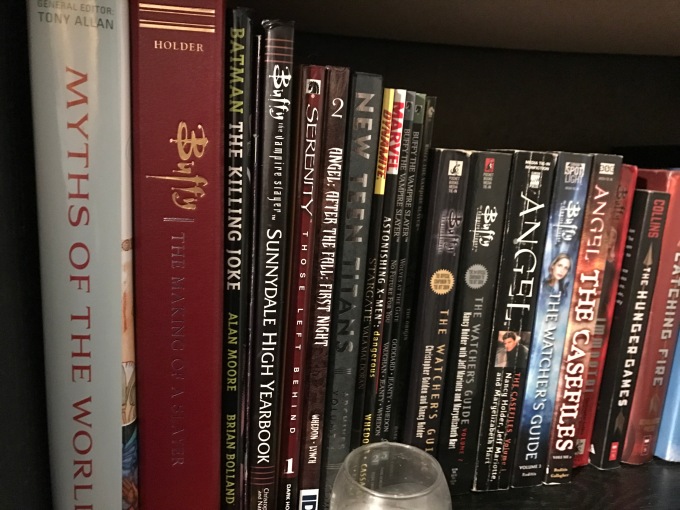
Twenty years ago today, my then-boyfriend/now-husband Ismael tried to get me to watch the first episode of a new show premiering on= the struggling WB network called Buffy the Vampire Slayer. I rolled my eyes at him. He had strange taste in television and, while I loved vampires, I had never felt compelled to see the movie. I just had no interest in it. Even after that day, Ismael kept pushing. No, the series was really good. It took him by surprise. It would take me until a year later to try an episode. That episode would be the two-parter, Surprise and Innocence, more popularly known as the episode where Buffy and Angel make love and Angel turns evil. I am not being hyperbolic–I wasn’t the same person after that. Buffy the Vampire Slayer changed my life, it changed how I saw myself and who I was as a person. It motivated me and informed who I am as an artist.
So, as a love letter to a series I can still recite the dialogue for, I’m going to discuss the top ways Buffy changed my writing and my life. Note – Spoilers ABOUND. If you haven’t watched…just watch the show. Seriously?
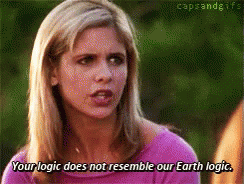
- Lexicons Change…Muchly. The sarcasm. The snark. The strange turn of words. I still refer to people as bitca. I’ll add ish to turn verbs into adjectives and age to nouns to make them verbs. If there’s something to be said, I’ll ‘pop culture’ it up. I abbreviate words that don’t have abbreviation. I give emotions place names, like Waah Waah Land. I reorder words to sentences in odd ways. Pathetic much? Probably, but I started this show when I was fifteen and deciding who I was going to be. Was I intending to be Buffy and The Scooby Gang? Not so much. But it found its way in and I can’t help going for some serious quirkage when I’m feeling chattish. Don’t be afraid to play with language, as long as your audience can understand you.
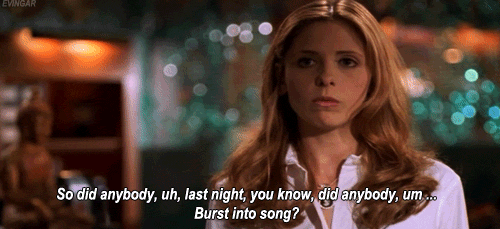
2. Risk-Taking Pays Off. When my boyfriend was busy bugging me about the series, he was very interested in the fact that the principal of the school was eaten in episode six. Seriously, it was his main selling point. I didn’t get it until they turned Buffy’s love interest evil in season 2…and kept him that way for the rest of the season. This show would do anything, and even when it hurt, I loved it. Joss Whedon, the series’ now well-known creator once said, “Don’t give people what they want, give them what they need.” And he did, solidly, for seven seasons. He disappointed us, but then he gave us great narrative reasons why our sadness was necessary. And Joss’ commitment to risk wasn’t just about risking his characters–it was about risking his reputation. He managed to craft and direct very risky episodes such as Hush, an episode with only 17 minutes of dialogue, The Body, an episode entirely about the strange and detached feeling of losing a loved one, and Once More, With Feeling, otherwise known as The Buffy Musical. All very risky, all paid off nicely. Taking creative risks with your work keeps it interesting.
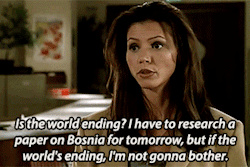
3. Happy Sadness is Okay. There are episodes of this series that make me laugh out loud and cry real tears. They make me worry for the characters, and they make me cringe in embarrassment. As a teenager, Buffy taught me that the confusion of my emotions was not strange. It was just life. Life can be twisty. As an artist, it taught me that genre isn’t a real thing in art. I mean, if you want to sell it, you need to know what genre it best fills. But when you’re writing it? Write the thing. Art is about portraying our journey in a way that makes sense to us. And our journeys aren’t romances or coming of age stories. They certainly aren’t comedies or dramas. They are all those things. Well, for some of us, they may not be a Western, but you get my point. Be free. Worry about labels later.

4. Success Does Not Come Without Clunkers. The Puppet Show. Ted. Most of Season 7…Oops. Some of the series wasn’t spectacular. There were episodes that I can only barely stand to rewatch when I do my rewatches. Which is proof positive that not everything you do is going to land with an audience. And that’s okay. BtVS is still judged as a whole and your body of work will likely be, as well. That doesn’t mean they’re all bad. Some really good lines from the series come from The Puppet Show, Season 7 led up to a spectacular ending, and Ted…well…Ted had John Ritter! So, even your missteps can yield positive results.
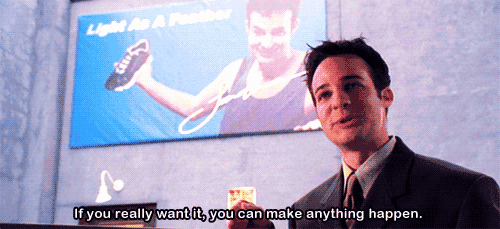
5. POV is Important. The Zeppo follows sidekick Xander through a day in which he stumbles blindly through a relatively minor issue while his friends deal with some world ending cataclysm we know nothing about. You know why? Because we’re with Xander and, frankly, he has no time for this Hellmouth thing. Superstar throws you into a world where Jonathan, a relatively minor recurring character, is suddenly a star, right down to getting placement in the title credits. In the Season 5 episode Buffy vs. Dracula, Dawn, a little sister we have never met thus far, just pops up, and we’re expected to accept it. She’s been planted there and the memories of the world has been altered to include her, but we don’t find that out until later. For now, we’re just surfing through the story, trying to figure out what is going on, and it adds a sense of mystery and foreboding we wouldn’t get if we knew everything. Point of view can make or break your story. Use wisely for best results.
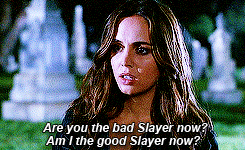
6. People CHANGE. Sometimes they change slightly, sometimes they are affected by something that completely and irrevocably alters the fabric of who they are. But the most important thing is that people evolve. I’m not who I was when I started watching Buffy. Buffy was much more mature, but also more dark inside, when she finished the series. Willow was stronger and wiser. Xander was more sober and careful. Dawn was less whiny. Giles was less up tight. Anya learned to care. Tara became confident. Angel and Spike repented for their wrongs. Faith went from tragic headcase to true hero. Cordelia became a higher being and Oz became a werewolf zen master. Your characters have to be altered when they finish their journey, or else what is the point?
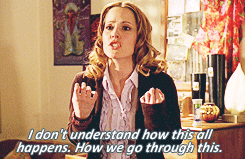
7. Know When to Hold Back. Joss Whedon and the writing team didn’t know what they were scripting when they created Earshot. In Earshot, an encounter with a demon gives Buffy mind-reading abilities, which lead to her overhearing a plot to kill all the students in her high school. It was scheduled to air in April 1999. And then, a week before the episode was to air, the Columbine High School Massacre happened. A freak moment of accidental prescience. Whedon and the network hurriedly pulled it off the airwaves because escapism isn’t fun once it isn’t escapism anymore. In that vein, artistically we should pay attention to when our work may be insensitive or cruel and be sure to yank that back. Art should not be used as a sword to harm.
A more artistic example of knowing when to hold back is evident in The Body. While the series had always been for mixing laughter and tears, for this episode, there is no laughter to be had. It is forty minutes of grueling sadness because it is so truthful, in a way that art should be truthful. Examining the emotions of the main characters after Buffy returns home to find her mother dead, The Body soars as an episode that doesn’t have half of the well-known Buffy style, because it can’t. Even vampire slaying because a numb, necessary event happening despite the main focus. Despite its sense of humor, Buffy knew when to take itself seriously.

8. Even People You Love Can Be Unlikeable. This one, I REALLY needed in my private life. The lesson was very strongly learned through the richness of characters in the Buffy Universe. I hated every character at some point. In Season 1, when Angel is all cryptic before disappearing, Batman-style, or when Cordelia doesn’t get that Buffy is cool, even when she saves her ass. In Season 2, when Xander decides it’s cool to make the entire female population of Sunnydale fall in love with him by magic and later doesn’t bother to tell Buffy that Willow is trying to re-ensoul Angel. In Season 3, when Willow and Xander cheat on Oz and Cordelia or when Buffy lets loose with Faith. In Season 4, when Buffy seems to forget about her friends or when Riley does ANYTHING. In Season 5, when Dawn whines incessantly or when Xander tries to convince Buffy to try to love Riley even though he betrayed her. In Season 6, when Willow gets addicted to magic and lies to Tara and when Buffy plays around with being a reckless idiot. In Season 7, when Buffy keeps screwing up, then making self-righteous speeches. Make your characters human. Make them flawed. We’ll love them all the more.
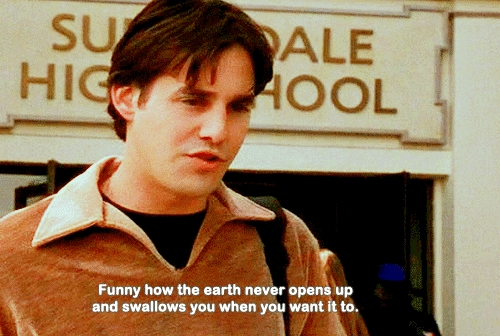
9. Make Things Relatable. So, you’re fighting a war against a hellmouth full of demons? Make it feel more like high school, so your audience can relate, since most of us…MOST of us…have never went to war against a hellmouth full of demons. Even with the craziest twists our stories take, we should never leave them out of our audience’s reach. Ground them to reality and make them that much more powerful. And speaking of powerful…

10. Who Run The World? WEIRDOS. Nothing showed me how to let my geeker flag fly like Buffy did. As I watched the characters in the series grow more powerful, and also as I watched Joss Whedon, a self-proclaimed geek, become more successful, I truly understood that the things that kept me from fitting in are also the things that make me interesting, that make my work unique. Embrace the weirdness. You’ll be stronger for it.
Finally, I want to thank Buffy the Vampire Slayer, the cast, the crew, the writers, and Joss Whedon for creating a show that taught me so much and guided who I would become. And also, thank you to my husband, whose incessant nagging (I say this lovingly) led me to become an even bigger fan than he was. If you’re a writer and you haven’t watched this series, you need to check it out. As silly as it sounds on the surface, it truly is a television masterpiece.
